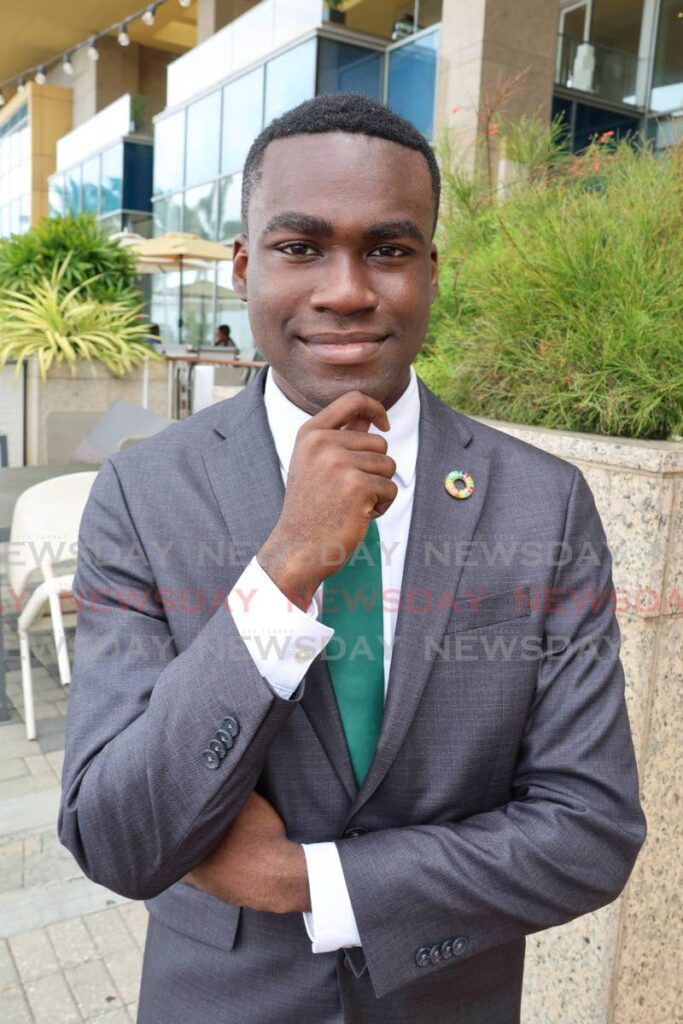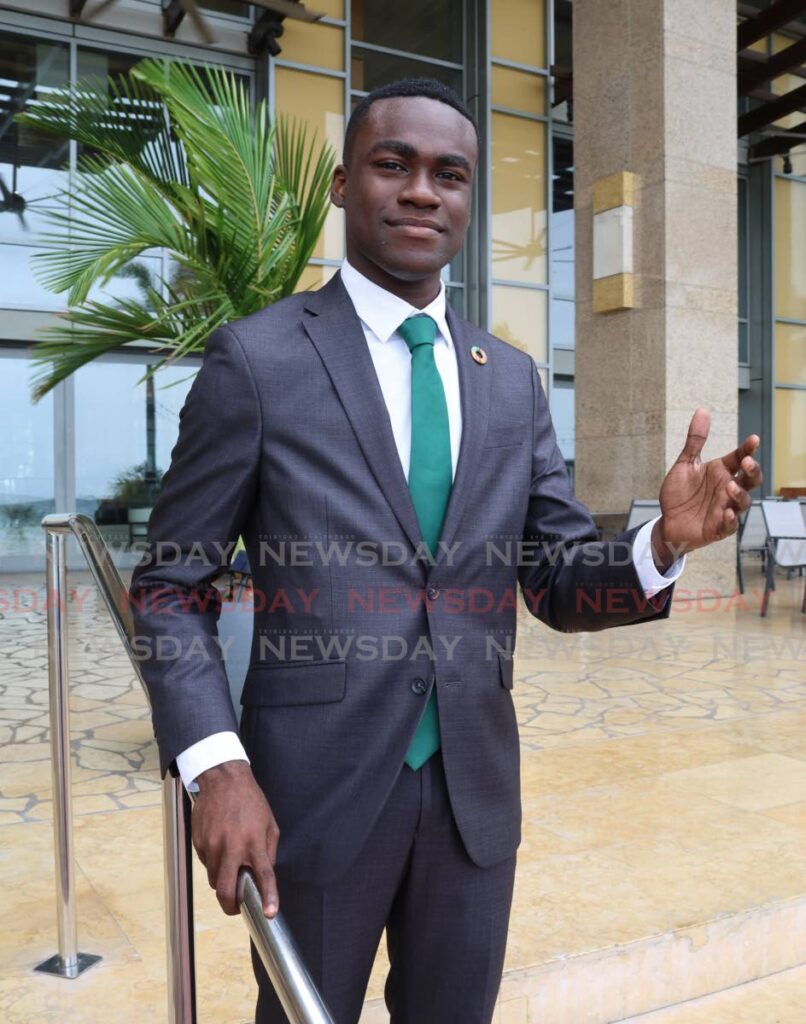Zion wants to build a better Trinidad and Tobago

A HERO was sometimes depicted as someone whose identity remained a secret, as he ran around in a cape doing good deeds.
However, today a real hero is often an individual admired for their courage, selflessness and noble qualities. Someone who is willing to take risks or make sacrifices to help others, while achieving a noble goal.
Our heroes of today live in our communities, and some of them we may know personally, but there are those who we have probably just heard about.
So in the coming weeks we will highlight several U-Reporters, young people who are a part of Unicef's flagship digital platform raising their voices on issues affecting them, who are heroes in their own right and have been doing exceptional things in their communities toward amplifying the voice of the youth of TT through their varied areas of specialty.
Today we feature community service activist Zion Benjamin.
COMMUNITY SERVICE has been a passion of 20-year-old Zion Benjamin since he was in his pre-teens. But in the past few years, he has become involved on a national level, and his greatest hope is to make a difference in the lives of the youth of TT.
The most recent platform for his altruism has been U-Report, which is managed by Unicef and the Office of the Prime Minister Gender and Child Affairs.
He explained U-Report is a platform which sends out polls to young people via WhatsApp and responses are accepted for a minimum of two weeks. The data from the responses is collected and assists in understanding what is happening in society.
The platform is a free, open-source messaging tool designed to address issues that young people care about. It allows for community participation, so marginalised groups and their communities have a voice on issues that matter to them, giving them the opportunity to influence and achieve positive change.
The anonymous responses are analysed in real time, and the data is mapped and compiled by age, gender and location. Results are displayed on a public U-Report website and anyone can access them.
“In this way, U-Report is ready to propel data-driven solutions to issues and give data to the leaders on issues our society faces,” he said.
Benjamin is a member of the Youth Steering Committee for U-Report as a representative of the Heroes Foundation, where he is vice-chair of partnerships as well as the Generation to Generation Council. The committee creates the poll questions, which are sometimes based on topics suggested by Gender and Child Affairs.
He said one issue of concern in TT is sexual violence, but in a recent U-Report poll answered by 412 people, 43 per cent of respondents said they were not aware of agencies or individuals to whom they could report cases of child abuse.
“Yes, the majority said they know, but that's still a large amount. It shows us we clearly need to do a lot of work in terms of educating persons on who these agencies are. So I think, in that way, U-Report is very useful in educating us.
“And there's always been a sentiment that we aren't really in touch with persons on the ground. I think this platform really connects us to the ground in a certain way, even though it does have its challenges. Because the persons who may be inclined to sign up and reply to something like this are those who are willing to be engaged, to be a part of and understand the role they have to play in society.
"So you may not necessarily get those who you really need to touch, but for the most part it does.”
Even before he joined the committee, Benjamin participated in the U-Report platform as a poll respondent. He said taking two minutes to reply to the polls helped give data to back up research.
He said there were 9,295 U-Reporters and the data collected was openly available to everyone. He hoped the data would make the government consider how it could work with NGOs, the private sector, lobbyist groups, the police and other organisations in a whole-of-society approach to making changes.
“If 96 per cent of the people in a poll agreed to something, we could go to the leaders with that data and show them it’s an issue that has to be addressed. We could ask, ‘What are you doing about it?’
“U-Report aims to be that more credible, nuanced and balanced of polls. It’s non-partisan, so no one could say the government or some private interest paid for the results. It’s really there to represent the people, not the people in power. It’s there to give the raw, unfiltered and unedited facts.”
He said the committee was working hard to increase the number of U-Reporters, so it did a lot of outreach in partnership with schools and NGOs in an effort to encourage more people to sign up.
He believed it needed to show young people why their participation mattered and give examples of how the public’s voice could make an impact.
“At the end of the day we’re trying to work with you to understand the issues you have and to help improve your lives. So you have to help us. It takes two hands to clap.”
Help us help you
Benjamin’s interest in advocacy started in the 4H club in primary school, where he had a lot of fun doing charity work. He then attended Trinity College East, where he joined the Heroes Development Programme, a school club run by the Heroes Foundation, in Form Three.
“They really helped in teaching me skills that wouldn’t necessarily be seen in the formal education system. And we had a lot of fun activities in interacting with other young people.”
He graduated from school in 2020 and was asked to join the Heroes Foundation as part of the newly-formed Generation to Generation Council, which was created to bridge the transition from the development programme to the foundation.
“The board at the Heroes Foundation recognised that we can't be an organisation for youth but not have that youth voice. So the Generation to Generation Council is really there to bring information, and guide policy and the direction of the organisation to make it the best it could be for the young people we serve.”

He was chair of the council from 2021-2023 and corporate secretary of the board from 2022-2024.
Last year, through the Heroes Foundation, he was appointed the youth representative on the Ministry of Health’s NCD Steering Committee, and in September 2023, the Ministry of Youth Development and National Service appointed him deputy Caricom youth ambassador for TT.
Benjamin said he was also passionate about what young people knew about Caricom, the Caricom Single Market and Economy and what those things meant to them. So he hoped the U-Report committee would include a poll on the topic for Caricom Day on July 4, as he believed very few youths thought about or understood what it meant to be a Caricom citizen.
If his belief turned out to be true, he said the government may need to do some work and come up with a programme to educate youths on what it meant to be a part of Caricom and how it benefited them.
He said in working with Youth Ministry, he realised it relied on data to guide policies and initiatives. He was also pleased the team he worked with there was willing to take advice and criticism from young people.
“We have a lot of work to do, in that we’re training young persons to be advocates and training them in leadership skills, but are hesitant to give those persons the opportunity to be the leaders.
“The committees I have been involved in really showed me there is a change, where people are more willing to accept young persons’ insights, listen to their concerns, accept criticism and give them a seat at the table.
"So the change is happening, but in general, I don’t think it’s fast enough.”
Born and raised in St Joseph, Benjamin attended UWI Open Campus, where he gained a certificate in criminology in 2021. In May of this year, he finished his law degree at UWI and is set to graduate with upper-second-class honours in November.
He told Newsday he did not have definite plans for his future but he was exploring opportunities in international relations and policy development.
He was currently leading a project called Bridging The Gap: From Classroom to Career, with the support of the Youth Ministry and its Youth Development team. The pilot programme, which will be held at South East Port of Spain Government, Success Laventille and Aranguez North Secondary Schools, will bring young people together to teach them non-academic skills including financial literacy, entrepreneurship, and resume and interview skills.
Benjamin put out a call to action to the young people of TT.
“If you’re between the ages of 13 and 29, message 296-7723 and follow the instructions to complete the sign-up to join U-Report.
"We all have a role to play in building a better TT, so I urge you to play your part in helping move our nation forward.”

Comments
"Zion wants to build a better Trinidad and Tobago"